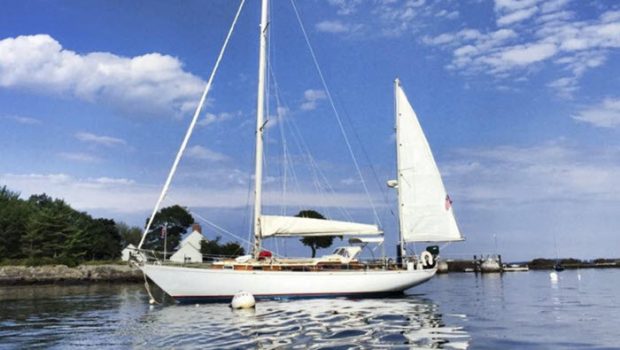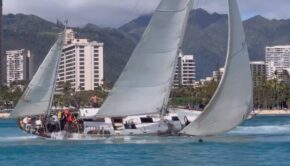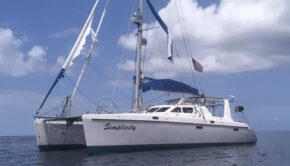Crew testimony in manslaughter trial
Published on January 9th, 2019
St. Thomas, Virgin Islands (January 9, 2019) – Two crewmembers of the 43-foot sailboat Cimarron (above) testified in federal court yesterday that Capt. Richard “Rick” Smith never stopped to search for fellow crewmember David Pontious after he jumped overboard in the midst of a psychotic episode while hundreds of miles offshore.
Meanwhile, defense attorneys worked throughout the day, Jan. 8, to establish that Smith’s actions were driven not by callousness, but out of concern for his remaining crew, after Pontious physically attacked him and tried to wrest control of the boat, endangering the safety of everyone aboard.
Smith, 65, owner of the 43-foot sailing vessel Cimarron, was charged Nov. 2 under what federal prosecutors described as the “Seaman’s Manslaughter Statute” in connection with the Oct. 25, 2015, drowning of Pontious, 54, of Beaufort, S.C., a crewmember who was helping transport the Cimarron from North Carolina to St. John for the winter charter season.
Pontious’s name is misspelled in court documents as “Pontius.”
Candace Martin testified Tuesday that she traveled from her home in Beaufort, S.C., to Maine in Oct. 2015 to help Smith deliver the Cimarron to St. John, but could not complete the journey and sought a replacement crewmember by placing an ad on an online forum for the Beaufort Yacht Club. Pontious responded to the ad and boarded the Cimarron in North Carolina, joining Smith and two other crewmembers, Jacob Pepper and Heather Morningstar.
The ship left North Carolina on Thursday, Oct. 22, 2015, and Pepper and Morningstar testified about the days leading up to Pontious’ death at around 1:30 a.m. the morning of Sunday, Oct. 25, 2015.
Defense attorneys Michael Sheesley and David Cattie highlighted various inconsistencies in their testimony and prior statements to U.S. Coast Guard investigators made in 2015, and Martin, Pepper, and Morningstar all said at times that they were struggling to recall certain details of the incident three years after it occurred.
While Martin was an experienced sailor, Pepper had only begun learning to sail at the time and Morningstar said she had some sailing experience, but had never embarked on such a lengthy offshore journey.
All three testified that Smith did not conduct any safety drills prior to starting the journey. Pepper and Morningstar’s testimony conflicted at times, with Pepper asserting that Pontious became seasick almost immediately and his condition steadily declined, preventing him from eating, drinking or working his scheduled shifts at the helm.
Morningstar said that Pontious was indeed seasick, but felt well enough to work nearly all of his scheduled watches, and did eat breakfast and dinner on Saturday, Oct. 24.
“We thought he was kind of turning a corner at that point,” Morningstar said. “Saturday night was when everything started to change.” While his nausea subsided, Morningstar said Pontious began slipping into delusions and hallucinations, and believed that the crew had kidnapped him to extort ransom money from his father. Pontious hallucinated a “door or portal” in the sky, through which he believed was a room that contained electronic equipment that could transport him back to reality.
Smith’s watch began at midnight, and Morningstar said Pontious grew increasingly agitated after he was denied access to the ship’s dinghy and life raft so he could seek out the portal in the sky.
“My goal was to just keep him calm because I didn’t know what to physically do at that point,” Morningstar said. Morningstar went below deck but remained on the staircase to the companionway and had a clear view of Smith, Pepper, and Pontious in the cockpit.
She watched as Pontious attempted to physically wrestle control of the ship’s wheel from Smith, and told him to “just sit down, you’re going to fall.” Pontious punched Smith, and at one point put his hands around his throat, Morningstar said. Smith told Pontious, “If you do that one more time, I’m going to slit your throat,” and Pontious said he was going to the portal regardless.
“Rick was like, ‘Ok, go,’ ” Morningstar said. Pontious jumped overboard and was never seen again. Sheesley seized on Morningstar’s assertion that Smith told Pontious, “Ok, go,” — a statement she had never before mentioned in previous interviews with Coast Guard investigators, and suggested she fabricated the detail after discussions with federal prosecutors, Assistant U.S. Attorneys Daniel Huston and Sigrid Tejo-Sprotte.
Morningstar said she and Pepper tried to look for Pontious with a spotlight, and asked Smith what to do. “He said Dave was a bigger threat to us in the boat,” Morningstar said. She said Smith refused to throw out a life ring, turn the ship around or put the dinghy overboard.
“I wanted to turn the boat around,” Morningstar said. “He did not want to turn the boat around because he thought Dave was too big of a threat.” Morningstar said her fear of Pontious turned to fear of Smith, after she realized she was trapped onboard a ship hundreds of miles offshore with no viable radio communication with a captain who did not stop to search for a missing crewmember.
“I’m terrified at this point,” Morningstar said. “We had no training at all for what to do on a man overboard.” Morningstar insisted she marked the coordinates where Pontious went overboard and that Smith did not make any attempt to call for help via radio — assertions Sheesley vehemently challenged, and said Smith did take the coordinates and went below deck to make a mayday call, to no avail.
Prosecutors highlighted the fact that Smith did not activate the ship’s VHF radio emergency beacon or the EPIRB device, which issues a distress call that summons U.S. Coast Guard rescuers. Smith made contact with the ship’s weather router via single shortband radio Monday morning — some 36 hours after Pontious went in the water — who summoned the Coast Guard, which flew a C-130 plane over the Cimarron to establish radio communication and begin the search for Pontious.
After the plane flew off, Morningstar said Smith threw one of the ship’s two life rings overboard and said “at least it’s going to look like I tried something.”
Martin, who said she had a brief flirtation with Smith, testified to her communication with him after Pontious went missing, and said he insisted he’d stopped and searched for Pontious for several hours until dawn. Following interviews with Coast Guard investigators in which they said Smith had kept sailing on to St. John, “he confirmed that he had left David in the middle of the ocean,” Martin said. Sheesley suggested Martin was a jilted lover with a vendetta against Smith, an accusation she adamantly denied.
“I’m looking for justice for David,” Martin said. Pontious’ brother Andrew Pontious also gave emotional testimony, describing their close relationship and the family’s heartbreak when David was lost at sea. He and his father Frank traveled to St. John to meet Smith upon his arrival, and he took them out to the Cimarron by dinghy.
“We wanted to know the last moments,” Pontious said. Smith told him they’d stayed in the area searching for several hours, and “he said he threw a life ring over immediately after,” Pontious said. “He complained he’d lost a good life ring that had been expensive.”
The trial continues this week.
Source: knox.villagesoup.com









 We’ll keep your information safe.
We’ll keep your information safe.